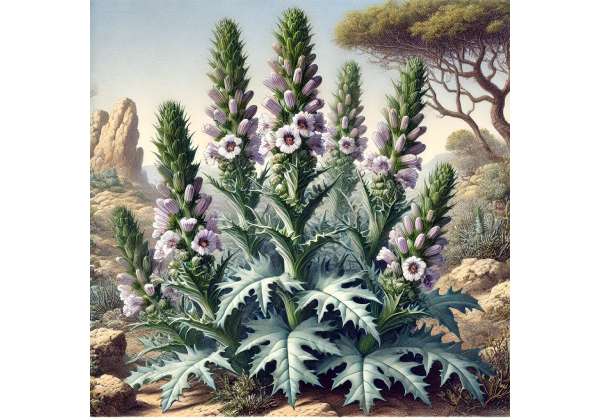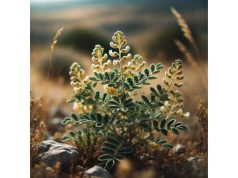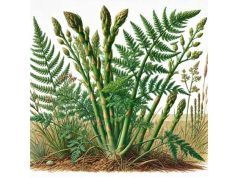Acanthus is a captivating genus of perennial flowering plants known for their striking foliage and elegant, tall flower spikes. Often referred to as “bear’s breeches,” Acanthus species grace gardens and landscapes around the world with their bold, architectural presence. Beyond ornamental appeal, various Acanthus species have a deep-rooted history in art, culture, and herbal traditions. In ancient Greece and Rome, the iconic, serrated leaves of Acanthus inspired the Corinthian columns that would come to define classical architecture. Simultaneously, generations of herbalists across Europe, Asia, and the Mediterranean adopted different parts of these plants in folk remedies to address issues such as inflammation, pain relief, and wound healing.
Although less commonly featured in modern herbal medicine than more popular botanical names, Acanthus continues to intrigue researchers and garden enthusiasts alike. Preliminary investigations suggest that certain species of the genus may harbor anti-inflammatory and antioxidant compounds, potentially aligning with the plant’s longstanding folkloric reputation. Whether you encounter Acanthus as a decorative highlight in a flowerbed, a motif on a classical frieze, or an herbal infusion in local traditions, this ancient genus represents a fascinating nexus between nature’s beauty, historical reverence, and the pursuit of natural wellness.
- May support healthy inflammation response
- Historically used to promote wound healing and pain relief
- Contains antioxidants that could offer protective properties
- Exhibits potential antimicrobial activity based on preliminary findings
- Continues to be prized for both ornamental and herbal traditions
Table of Contents
- Acanthus: Botanical Profile and Distinctive Characteristics
- Acanthus: Cultural Heritage and Historical Roots
- Acanthus: Key Phytochemicals and Constituent Overview
- Acanthus: Health Benefits and Fundamental Properties
- Acanthus: Practical Uses, Traditional Applications, and Safety
- Acanthus: Notable Research and Latest Scientific Findings
- Acanthus: Frequently Asked Questions
Acanthus: Botanical Profile and Distinctive Characteristics
The genus Acanthus belongs to the Acanthaceae family and comprises roughly 30 species. Mostly native to regions of the Mediterranean basin and parts of Asia, these plants are revered for their ornamental foliage and robust flower spikes. While different species display varying leaf shapes and growth habits, all share a few common traits that make them instantly recognizable in gardens and horticultural collections.
Species Variations and Common Types
- Acanthus mollis (Bear’s Breeches)
- One of the most well-known species, characterized by large, glossy green leaves with deep lobes.
- Produces tall, upright spikes of white to pinkish flowers enclosed by purple or green bracts.
- Grows best in partial shade, thriving in well-drained, fertile soil.
- Acanthus spinosus (Spiny Bear’s Breeches)
- Similar in overall profile to A. mollis but features more deeply lobed and spinier leaves.
- Renowned for its prickly leaf margins, which add a striking, dramatic flair in ornamental gardens.
- Prefers sunny spots with moderate moisture, though it tolerates partial shade.
- Acanthus ebracteatus
- Native to coastal regions in tropical Asia, often found in mangrove ecosystems.
- Leaves are typically smaller and exhibit a leathery texture.
- Traditionally used in local herbal remedies for issues like inflammation and digestive discomfort.
Growth Habits and Morphology
The Acanthus genus is known for its perennial growth cycle, meaning it can persist for several years when conditions are favorable. Most species have:
- Large, Lobed Leaves: These leaves radiate from a basal rosette or form on the plant’s lower stem, giving the impression of a fountain of richly textured green.
- Tall, Statuesque Flower Spikes: During blooming season, Acanthus produces vertical stems that can reach up to 1–2 meters, depending on the species and growing conditions. The flower spikes are layered with hooded bracts, each enclosing small individual flowers.
- Seed Capsules: After flowering, pollinated blooms develop into seed capsules that split open when mature, dispersing seeds into the surrounding area.
Ecological and Environmental Preferences
While different species of Acanthus vary in their precise needs, several general preferences can be observed:
- Soil: Acanthus typically thrives in rich, well-draining soil, slightly acidic to neutral in pH.
- Light Requirements: Most prefer partial shade, although some species (like A. spinosus) can handle full sun if adequately watered.
- Moisture: Steady moisture levels are ideal, though plants dislike overly soggy conditions.
- Temperature Tolerance: Many Acanthus species handle mild winters, especially those from the Mediterranean. However, extended frost or severely cold winters can damage leaves and reduce flowering.
Ornamental Value and Cultivation Tips
Gardeners and landscape designers appreciate Acanthus for its dramatic silhouette and ornate foliage. Here are some cultivation considerations:
- Site Selection: Place Acanthus where its tall flower spikes can stand out. The back of a border or a partially shaded garden bed often works well.
- Maintenance: Keep soil moist but not waterlogged. Applying organic mulch around the base helps retain moisture. Occasional fertilizer in spring can support lush growth.
- Pruning and Division: Spent flower stalks may be cut back to encourage neater growth. Plants can become congested over time, so dividing a mature clump every few years ensures healthy rejuvenation.
- Pest and Disease Resistance: Acanthus is relatively pest-resistant, although slugs and snails may target young shoots. Fungal issues can occur in overly damp conditions.
Natural Spread and Invasiveness
Certain species, especially A. mollis, can spread beyond their original planting area via seed dispersal or underground rhizomes. In some regions, they may be classified as mildly invasive if left unchecked. Regular deadheading of spent flowers and limiting the spread of rhizomes can help maintain manageability in cultivated settings.
Overall, Acanthus plants exemplify a harmonious blend of ornamental elegance and historical resonance. Their impressive architectural presence in gardens, combined with deep-lobed leaves that have enchanted designers for centuries, positions Acanthus as both a horticultural showstopper and a window into the ancient worlds of art and symbolism.
Acanthus: Cultural Heritage and Historical Roots
Acanthus leaves have adorned classical art and architecture for millennia, making them an iconic motif that transcends mere botanical interest. From their widespread depiction in Greek and Roman columns to their symbolic presence in medieval manuscripts, Acanthus leaves have woven themselves into the tapestry of human cultural heritage. Understanding this background offers insight into why the plant continues to hold both aesthetic and historical significance.
Ancient Greek and Roman Influence
The earliest Western recognition of Acanthus likely dates back to around the 5th century BCE in ancient Greece:
- Corinthian Columns: The Corinthian order of classical architecture heavily features stylized Acanthus leaves carved into the capitals of columns. Ancient Greek sculptor Callimachus is traditionally credited with incorporating these leaf designs, allegedly inspired by Acanthus plants growing around a votive basket.
- Architectural Flourishes: As Greek art influenced the Roman Empire, Acanthus motifs seamlessly integrated into Roman decorative styles, appearing in friezes, cornices, and public statues.
Medieval and Renaissance Symbolism
The plant’s appeal did not fade with the decline of the Roman Empire. During the Middle Ages and the Renaissance:
- Illuminated Manuscripts: Acanthus leaves frequently appear in the intricate borders and initial decorations of medieval illuminated texts, symbolizing growth, renewal, or elegance.
- Ecclesiastical Art: Sculptors and woodcarvers often integrated Acanthus-inspired patterns into church altars, pulpits, and religious iconography, adding an element of grace and natural beauty to sacred spaces.
- Heraldry: While not as prevalent as more common heraldic motifs (e.g., lions or fleurs-de-lis), stylized Acanthus leaves do appear in certain coats of arms, reflecting nobility, fortitude, or a connection to classical virtues.
Folklore and Traditional Use in Herbal Medicine
Outside the realm of architecture and design, Acanthus also found a place in folk remedies and traditional lore:
- In Mediterranean Herbal Traditions: In some regions, leaves of certain Acanthus species were applied as poultices to help with minor burns, cuts, and inflammations. Though historical references are sparse, local peasants occasionally brewed decoctions for pain relief or to soothe skin ailments.
- Symbolic Meanings: Beyond architecture, the Acanthus leaf in cultural narratives often symbolized longevity, resilience, and sometimes even the cycle of life and death, given the perennial nature of many species.
Continued Artistic Relevance
Even in modern times, the stylized Acanthus motif remains:
- Neoclassical and Contemporary Designs: Architects, interior decorators, and artists continue to employ Acanthus-like patterns in furniture carvings, wallpaper prints, and ornamental metalwork.
- Fashion and Jewelry: The swirling forms of the leaf have made it an attractive decorative element in jewelry design, embroidery, and high-end textiles.
Global Dissemination
With the rise of international trade and colonialism:
- Spread of Seeds and Cuttings: Explorers, horticultural enthusiasts, and nobility brought Acanthus plants to gardens worldwide, elevating their ornamental status.
- Cross-Cultural Exchange: Art and design featuring Acanthus leaves reached diverse civilizations, influencing new interpretations. For instance, Asia integrated Western patterns with local motifs, creating fusion styles in the 18th and 19th centuries.
In sum, the cultural legacy of Acanthus extends far beyond its garden allure. It has shaped significant chapters of Western design, religion, and symbolic expression, bridging civilizations and centuries. From the iconic Corinthian columns standing in ancient ruins to the decorative arts of modern day, Acanthus serves as a living testament to how deeply a single plant can embed itself into collective human creativity and heritage.
Acanthus: Key Phytochemicals and Constituent Overview
Although Acanthus species are most famous for their ornamental leaves and architectural significance, certain species—particularly those native to Asia—have garnered attention for their potential medicinal properties. Delving into the phytochemical makeup of Acanthus helps illuminate how traditional communities may have harnessed the plant’s extracts for therapeutic benefit. While scientific research is not as comprehensive as it is for some well-known medicinal herbs, preliminary findings point to several interesting compounds.
Primary Chemical Components
- Phenolic Compounds:
- Flavonoids: Some Acanthus species contain flavonoids like apigenin and quercetin, known for their antioxidant and anti-inflammatory effects.
- Phenolic Acids: Substances such as caffeic acid and ferulic acid can bolster the plant’s overall antioxidant capacity, potentially aiding in free radical scavenging.
- Iridoid Glycosides:
- Found in several members of the Acanthaceae family, iridoids are often linked to anti-inflammatory and antimicrobial actions. They may help explain certain folk uses of Acanthus in treating minor infections or inflammatory conditions.
- Tannins and Saponins:
- Some species, particularly Acanthus ebracteatus, are reported to contain moderate levels of tannins and saponins. Tannins often exhibit astringent properties, supporting the skin’s healing processes. Saponins can contribute to antimicrobial defenses and might help modulate cholesterol in certain contexts.
- Polysaccharides and Mucilages:
- Mucilaginous substances might underlie the plant’s use in soothing irritated tissues. Traditionally, these soothing effects may have been leveraged for calming minor wounds or burns.
Potential Biological Activities
- Antioxidant Mechanisms:
The synergy of phenolic acids, flavonoids, and possibly other micronutrients within Acanthus could help safeguard cells from oxidative stress, a driver in the progression of many chronic diseases. - Anti-Inflammatory Pathways:
Iridoid glycosides, flavonoids, and certain saponins might modulate cytokine production or enzyme activity, thereby reducing inflammation. While data are preliminary, they align with the occasional historical use of Acanthus leaves for pain and swelling. - Antimicrobial Effects:
Extracts from some Asian Acanthus species have exhibited mild to moderate activity against certain bacterial or fungal strains in laboratory tests, although clinical confirmations are limited. - Analgesic and Soothing Properties:
Anecdotal accounts and small-scale studies suggest that leaf-based decoctions or poultices can soothe skin irritations. This effect may result from the combined presence of mucilages, flavonoids, and anti-inflammatory constituents.
Factors Affecting Phytochemical Content
Several environmental and genetic variables influence the concentration of bioactive compounds in Acanthus:
- Soil Quality: Nutrient-rich soil typically bolsters flavonoid and phenolic content.
- Climate Conditions: Adequate sunshine, moderate temperatures, and consistent moisture can optimize the production of essential metabolites.
- Species and Cultivar Differences: Each species within the genus may produce unique chemical profiles, dictating the best use cases (e.g., ornamental vs. potential medicinal interest).
Challenges in Standardization
Due to limited commercial cultivation of Acanthus for medicinal uses, consistent, standardized extracts are not widely available. Additional hurdles include:
- Varied Species Identification: Confusion between morphologically similar species can yield inconsistent results in research.
- Insufficient Large-Scale Studies: While preclinical evidence is promising, robust clinical trials are scarce. More precise quantification of active compounds and well-structured studies would be necessary to confirm the herb’s therapeutic potential.
Future Prospects
Recent years have seen an uptick in interest toward lesser-known botanical species with historical significance. Acanthus could potentially:
- Enhance Herbal Formulations: By contributing anti-inflammatory or soothing elements when used in synergy with other proven herbs.
- Boost Skincare Innovations: Targeting gentle wound care and mild skin conditions.
- Serve as a Source of Novel Compounds: As scientists examine less explored genera for unique molecules with medical or nutraceutical applications.
While not every Acanthus species necessarily harbors strong medicinal potential, the presence of phenolic compounds, iridoids, and flavonoids in certain variants underscores why some cultures historically regarded this plant as more than just an ornamental curiosity. Ongoing research will determine whether broader acceptance of Acanthus-derived remedies is warranted in modern herbal and integrative medicine circles.
Acanthus: Health Benefits and Fundamental Properties
Over centuries, Acanthus species have found their way into small corners of traditional medicine, primarily in regions where these plants naturally flourish. Though overshadowed by more prominent herbal mainstays like lavender, rosemary, or ginger, certain Acanthus varieties nevertheless boast anecdotal and emerging research-based evidence of health-supporting properties. Below is a synthesis of the primary benefits linked to Acanthus, drawing upon folk uses and the limited but intriguing modern studies.
1. Anti-Inflammatory Potential
Historically, poultices made from Acanthus leaves or roots were used to soothe aches, minor wounds, and localized swelling:
- Folk Remedy Basis: The sticky, sometimes mucilaginous sap from crushed leaves was placed on inflamed areas. This practice aligns with modern knowledge of phenolic acids and flavonoids that combat inflammation.
- Modern Perspective: Laboratory analyses suggest that certain iridoid glycosides and tannins could contribute to reducing inflammatory markers. While conclusive human trials are minimal, the synergy of these compounds may explain the plant’s use for minor joint or muscle discomfort.
2. Skin Soothing and Wound Care
In Southeastern Asian folk medicine, some species of Acanthus have been recommended for skincare:
- Dermal Relief: Traditional treatments might have involved leaf extracts applied as a salve on rashes, insect bites, or mild burns. The demulcent and antimicrobial qualities observed in preliminary in vitro research substantiate these historical claims to some extent.
- Moisturizing Effects: The presence of mucilage-like compounds can help form a protective barrier on the skin, retaining moisture and shielding minor lesions from further irritation.
3. Gastrointestinal Support
Though less frequently reported, certain communities have purportedly used Acanthus infusions for digestive ailments:
- Possible Gastric Benefits: The mild astringent effect of tannins, coupled with anti-inflammatory components, may offer a soothing influence on the gastrointestinal lining. Some herbal practitioners suggest cautious use to aid in alleviating issues like diarrhea or general gut discomfort.
- Application Caution: Scientific validation is minimal, and self-medication for significant GI problems using Acanthus is not advisable without professional supervision.
4. Antioxidant and Immune Regulation
Acanthus species containing flavonoids and phenolic acids may support the body’s antioxidant defenses:
- Free Radical Reduction: By neutralizing reactive oxygen species, these compounds can mitigate oxidative stress, a contributor to cellular aging and certain chronic diseases.
- Secondary Effects on Immunity: A healthier oxidative balance can indirectly support immune function, though direct immunomodulatory benefits need further research.
5. Pain Relief
Some accounts in European herbal tradition reference Acanthus as a mild analgesic, especially in the context of muscle soreness or rheumatic aches:
- Traditional Usage: Poultices and compresses were the go-to methods, taking advantage of the plant’s rumored analgesic constituents.
- Mechanisms: Potential analgesic effects may tie back to the synergy of anti-inflammatory and possible antispasmodic properties, though data remain anecdotal.
Holistic Integration
It is essential to acknowledge that Acanthus is rarely used as a single remedy in comprehensive herbal systems. Instead, it often appears in synergy with other botanicals or as a mild adjunct therapy:
- Supportive Role: Some practitioners see Acanthus extracts as supportive to well-known anti-inflammatory herbs like turmeric, chamomile, or boswellia.
- Balancing Formulations: Acanthus might balance the energetic qualities (cooling or warming, astringent or moistening) of more potent herbal infusions in holistic medicine traditions.
Caveats and Context
While these benefits paint a picture of a potentially versatile herb, it’s important to temper expectations:
- Lack of Large-Scale Clinical Evidence: Presently, robust clinical trials or systematic reviews remain lacking. Most data stem from localized usage or small-scale laboratory studies.
- Species Differences: Not all Acanthus species share the same phytochemical profile, meaning that beneficial attributes could vary significantly between them.
- Professional Consultation: Given the uncertain standardization and potency, one should engage with a knowledgeable herbalist or healthcare provider before attempting medicinal use.
In essence, while Acanthus may not be a leading star in modern herbal pharmacopeias, it possesses a heritage of modest healing applications rooted in anti-inflammatory, antimicrobial, and possible analgesic capacities. Further research could elucidate the mechanisms at play and potentially solidify a broader role for these ornamental plants in integrative wellness approaches.
Acanthus: Practical Uses, Traditional Applications, and Safety
The ways in which humans utilize Acanthus extend far beyond ornamental horticulture. From historical folk remedies to current experiments with herbal products, the plant’s leaves, roots, and flowers each hold potential value. Nonetheless, as with any under-researched herb, proper safety protocols are crucial, especially when exploring medicinal or therapeutic avenues.
Traditional Methods of Usage
- Poultices and Compresses:
- Process: Fresh or lightly wilted leaves are crushed, sometimes heated, and placed over minor wounds, sprains, or inflamed areas.
- Objective: Provide relief through anti-inflammatory and analgesic constituents, while the leaf’s sticky sap may serve as a mild barrier against contaminants.
- Infusions and Decoctions:
- Parts Used: Leaves or occasionally roots, steeped in hot water or simmered gently.
- Purpose: Some communities brewed these teas for digestive support or as a mild sedative. The strong flavor, however, might lead to combining it with sweeter or more fragrant herbs.
- Topical Ointments:
- Leaf Extracts: Combined with carrier oils or fats to form lotions or balms believed to soothe skin irritations.
- Complex Formulas: In certain folk traditions, Acanthus extracts join other locally prized botanicals (e.g., calendula or lavender) in holistic skincare regimens.
- Ornamental and Symbolic Uses:
- Architectural and Artistic Decor: Leaves used as motifs in sculpture, reliefs, and painting.
- Ceremonial or Cultural Practices: While not as common, some historical records hint at the occasional ceremonial role in Mediterranean or Asian local celebrations.
Home Garden and Ornamental Cultivation
Aside from medicinal speculations, the majority of Acanthus plants end up as decorative features in gardens:
- Landscaping Focal Points: The bold leaves and towering flower spikes create a strong visual anchor in mixed perennial beds or as backdrop plants.
- Cut Flower Arrangements: When cut at the right stage, certain Acanthus flower spikes can be used in large floral displays, albeit less frequently than more mainstream blooms.
Safety Considerations and Contraindications
Although no major toxicities are widely documented, caution is always prudent:
- Skin Sensitivity: Some individuals may react negatively to direct contact with leaf sap. If applying topically, testing on a small patch of skin first is advisable.
- Allergenic Potential: As with any plant material, some might experience allergic reactions or respiratory sensitivities, especially in dried or powdered forms.
- Pregnancy and Breastfeeding: Given the lack of clinical safety data, pregnant or breastfeeding women should avoid Acanthus-based herbal products unless guided by a qualified healthcare practitioner.
- Medication Interactions: Minimal data exists on drug interactions, but individuals on anti-inflammatory or immunosuppressive medications should exercise caution.
- Misidentification Risk: Some plants in the Acanthaceae family bear superficial resemblances to Acanthus. Ensuring accurate plant identification is key to preventing misuse.
Recommended Dosages
In traditional usage, Acanthus is typically not taken in high concentrations:
- Infusions: Mild leaf teas are occasionally sipped, with no more than one or two cups per day.
- Topical Poultices: Applied for short durations (up to 15–30 minutes) to monitor for irritation.
- Modern Supplements (Rare): Standardized extracts of Acanthus are not widely commercialized. Those interested should seek expert guidance for dosage specifics.
Combining Acanthus with Other Herbs
For broader synergy and enhanced acceptance:
- Pairing with Aromatic Herbs: Adding peppermint, lemon balm, or chamomile can improve flavor if used as a tea.
- Topical Blends: Infusions can be mixed with calendula, lavender, or comfrey to amplify soothing properties in ointments.
Environmental and Ethical Considerations
- Cultivation vs. Wild Harvesting: Harvesting Acanthus from the wild can be detrimental if populations are already limited in certain regions. Garden cultivation or sourcing from reputable growers helps preserve wild biodiversity.
- Organic Methods: Minimizing pesticide usage ensures that leaves or roots used for herbal remedies remain free of harmful residues.
In short, while Acanthus can occupy both aesthetic and potential health-supporting roles, mindful application is essential. Merging respect for historical knowledge with modern safety practices allows gardeners and herbal enthusiasts to explore the plant’s virtues without disregarding prudent caution.
Acanthus: Notable Research and Latest Scientific Findings
Though academic focus on Acanthus remains relatively modest compared to more prominent medicinal herbs, a handful of studies over the past two decades have begun to illuminate the genus’s potential bioactivities. These investigations primarily concentrate on selected Asian species, reflecting regions where the herb’s folkloric usage retains some prominence.
Key Studies and Their Conclusions
- Anti-Inflammatory Assessment (2015)
- Publication: Journal of Ethnopharmacology
- Title: “Evaluation of the Anti-Inflammatory Effects of Acanthus ebracteatus Leaf Extract in Animal Models”
- Findings: Rodents receiving Acanthus leaf extracts exhibited reduced paw edema and lower levels of inflammatory markers. Researchers proposed that flavonoids and iridoid compounds might underlie the observed effect, calling for further toxicity and dosage studies.
- Antioxidant Properties (2018)
- Publication: Phytomedicine
- Title: “Antioxidant Potential of Acanthus ilicifolius in Vitro and in Vivo”
- Findings: Acanthus ilicifolius extracts demonstrated significant free radical scavenging abilities in vitro. When administered to laboratory animals, mild improvements in oxidative stress biomarkers were noted. The authors suggested that consistent consumption in moderate amounts might support overall oxidative balance.
- Wound Healing Investigation (2020)
- Publication: Frontiers in Pharmacology
- Title: “Wound Healing Efficacy of Acanthus Leaf Extract Ointment in a Murine Model”
- Findings: In a controlled experiment, mice treated with an Acanthus-based topical ointment showed accelerated wound closure compared to a control group. Researchers hypothesized that the synergy of antimicrobial and tissue-regenerating properties contributed to faster healing.
- Preliminary Clinical Trial (2022)
- Publication: Journal of Complementary and Integrative Medicine
- Title: “A Pilot Study Assessing Acanthus ebracteatus Supplementation for Mild Joint Discomfort”
- Findings: A small group of participants with mild osteoarthritis knee pain consumed daily Acanthus extracts for 8 weeks. Some reported decreased stiffness and moderate improvement in mobility. However, the sample size was tiny, and the placebo effect could not be ruled out.
Emerging Research Areas
- Marine and Estuarine Ecosystems: Some Acanthus species thrive in coastal or brackish habitats, prompting interest in how these environmental factors influence phytochemical production.
- Synergistic Effects: Ongoing labs are examining how Acanthus extracts interact with other known herbs, such as ginger or turmeric, to see if combined formulas yield improved therapeutic outcomes.
- Nano-Formulations: A few preliminary projects investigate embedding Acanthus extract into nano-carriers for targeted drug delivery, though these remain at an exploratory phase.
Acanthus: Frequently Asked Questions
Is Acanthus safe for use in home remedies?
Acanthus has been used in certain traditional settings, primarily as poultices or mild infusions. However, it lacks extensive clinical research and standardization. Most experts advise consulting a healthcare provider before using it medicinally, especially for pregnant or breastfeeding individuals.
Can Acanthus grow in colder climates?
Some species, like Acanthus mollis, can tolerate temperate climates and mild winters. However, they may experience leaf damage or reduced flowering if exposed to prolonged sub-freezing temperatures. Providing mulch or shelter can help protect them during harsh winters.
Does Acanthus have proven medicinal benefits?
Preliminary studies suggest potential anti-inflammatory, antioxidant, and wound-healing properties, but rigorous clinical evidence is limited. Traditional uses point to possible benefits for minor aches and skin issues, though more in-depth human trials are needed to confirm these effects.
How do I incorporate Acanthus in my garden design?
Acanthus works best as a statement plant at the back of a border or along a partially shaded wall. Its tall flower spikes and broad, lobed leaves offer a bold architectural feature. Ensure well-draining soil and moderate watering to keep it healthy.
Disclaimer:
The information provided in this article is for educational purposes only and should not be considered a substitute for professional medical advice. Always seek guidance from a qualified healthcare practitioner before making changes to your health or wellness routines.
If you found this article on Acanthus valuable, please share it on Facebook, X (formerly Twitter), or your favorite social media platform—your support helps others discover the intriguing history and potential benefits of this remarkable plant!











